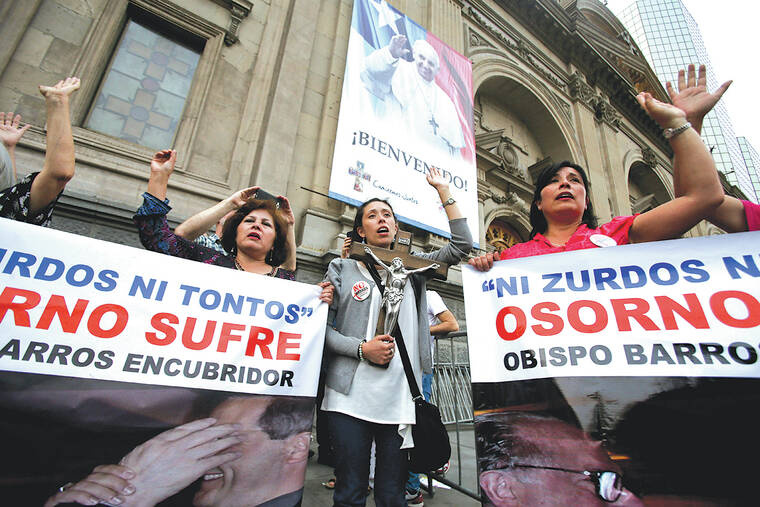In Chile, justice eludes victims of Catholic clergy sex abuse years after the crisis exploded
SANTIAGO, Chile — Soon after she learned what happened, Helmut Kramer’s mother grabbed a pair of scissors and cut the priest out of photographs from her son’s baptism.
“She kept the photos after that,” said Kramer, who was sexually abused at age 12 in a Jesuit school in Antofagasta, a city in northern Chile.
“My mom is still Catholic, but she never attended Mass again. She says that she will never set foot in a church, and she does not trust the pope or any priest,” the 53-year-old Chilean said.
His mother’s feelings echo hundreds of Chileans who have distanced themselves from the Catholic Church since 2010, when victims of another priest, Fernando Karadima, raised awareness about clergy sex abuse in the South American country.
The Karadima case shook the Vatican itself and marred Pope Francis’ trip to Chile in 2018. Instead of applause, he was greeted with unprecedented protests against a papal visit. The scenario worsened when Francis accused Karadima’s victims of slander. He later admitted he made “grave errors” in judgment and invited them to Rome to beg their forgiveness.
According to polling firm Latinobarómetro, the decline in confidence in the Chilean Catholic Church is one of the largest in Latin America. It fell from 77% in 1996 to 31% in 2020. Currently half of Chile’s 18 million population identify as Catholic and the number of religiously unaffiliated rose from 18% in 2010 to 35% in 2020.
“This wasn’t a crisis, this was a cultural break from the Catholic Church,” said Chilean historian Marcial Sánchez. “Chilean society felt cheated by the church.”
There has been little justice in cases of clerical abuse. Some offenders were defrocked, but few have received criminal convictions, according to advocates. Some died before receiving any punishment from the church or the courts.
Not long after the pope’s visit, Helmut Kramer joined other victims to launch “Red de Sobrevivientes Chile” (Chile’s Survivors Network), which widened its scope to support victims abused in foster homes, scout groups and sports clubs.
“We created the first map of abusers in an ecclesiastical context and introduced a political discourse: The problem of abuse is a human rights issue and must be treated accordingly,” Kramer said.
Human rights violations are a sensitive topic for Chileans who still mourn the losses of loved ones during the dictatorship of Augusto Pinochet (1973-1990). Kramer himself grew up during those tough times and now realizes how the political scenario influenced his own abuse experience.
“We were in a context in which everything was quiet. You couldn’t speak about anything,” Kramer said.
And so, for 35 years, he kept silent.
•••
The first time he spoke about his case, Jaime Concha was a 55-year-old doctor watching the news after a long day at the hospital. What he saw on TV shocked him: a report about victims claiming clergy sex abuse at the Marist Brothers’ school where he studied from age 10.
It took him a few minutes to turn to his wife and say: “That happened to me as well.”
Hoping for understanding and comfort, her reaction left him speechless. “Breaking the silence relieves you, but you also feel responsible for the suffering you share,” Concha said. “When I told my partner, it was unbearable for her.” She called him an anti-gay slur and accused him of hiding his sexuality from her.
Four decades before that, when he was abused by several Marist Brothers and priests from his school, he wasn’t even sure that the abuse had taken place at all.
“The first time it happened, I thought it had been something I had made up,” Concha said. “The Marist Brothers were representatives of God. Not just power figures, but our connection to God.”
It took him years and endless nights of guilt, self-loathing and mistrust to process that what happened to him was abuse.
“I had every reason to throw myself off the balcony,” he said. “Then why am I still alive? Because despite everything, there is a God who loves me.”
Now 60 years old, Concha said, “I still believe in a God who has always taken care of me, who has allowed me to be on the brink and has never thrown me off the precipice.”
•••
Many Chilean victims who became activists to advocate for children’s rights share a common thought.
For them, what underlies clergy sex abuse is not the Catholic Church or any other institution, but the asymmetrical use of power.
“The Pope himself said that this is a matter of abuse of power in abusive cultures, of cover-ups that ensure impunity,” said one of Karadima’s victims, José Andrés Murillo, who met with Francis at the Vatican in 2018.
He, too, wished to become a priest once. When he met Karadima in an upper-class neighborhood in Santiago at age 15, the priest was expected to become a saint.
“I think we are still just seeing the tip of the iceberg of the violence of the churches toward children,” Murillo said.
He is now the director of Fundación para la Confianza (the Trust Foundation), which offers free psychological, judicial and emotional support for abuse survivors. Murillo said that new victims reach out to him every single day.
“Traumatic experiences open up a space toward self-destruction, toward the destruction of others or to find a way to fight,” he said. “I don’t want other people to experience what I experienced.”


